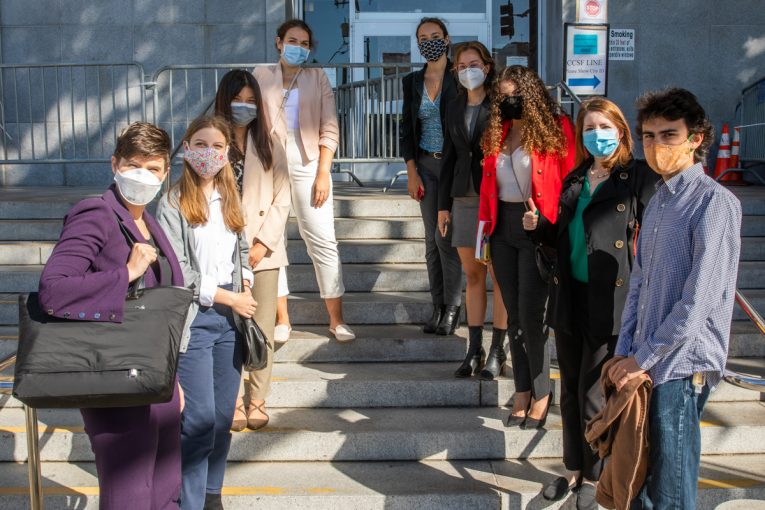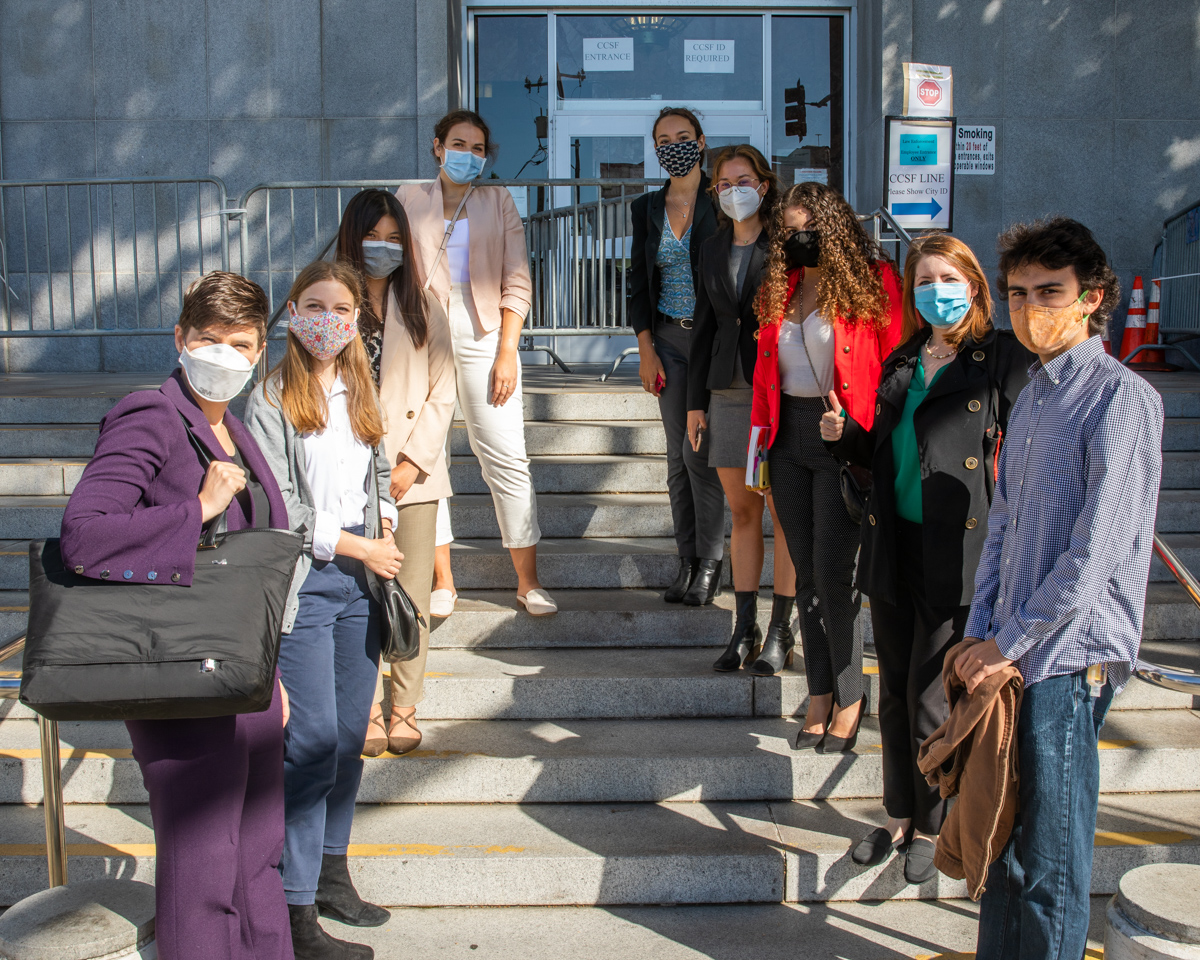

By Layla Mustafa
SAN FRANCISCO, CA – The Vanguard has provided continued coverage on San Francisco Court’s public access—or rather the lack thereof.
At the time of writing this article, it has been 373 days since San Francisco’s initial shelter in place order, and the nationwide migration to conduct business via a virtual platform.
It has been over a year, and we are still expected to accept that the court has been subjected to 373 days of technical difficulties—rendering it incapable of providing comprehensive remote access to the courts.
Following an early inquiry, the San Francisco Superior Court insisted that the public may access court in-person or through their YouTube channel.
Two weeks ago, the Vanguard conducted an investigation on the reliability of the YouTube channel and found, “Over the past 34 days, we checked the YouTube channel a total of 88 times. There were a total of 16 live streams present, with only eight of them having audio and visual.”
That’s less than a 10 percent success rate, or one successful livestream about once every four days or so.
Meanwhile, the Vanguard reporters can watch—on livestream—dozens of court hearings DAILY in superior courts around the state. But not San Francisco.
With this case study taken into consideration, it may be assumed that in order to gain widespread access to San Francisco court proceedings you must be present in the courthouse.
Does this imply that San Francisco does not view in-person appearances as a safety hazard?
This doesn’t appear to be the case.
Attorneys, court reporters, witnesses, and sometimes clients, are all able to choose to either attend court in-person or safely appear via ZOOM. By allowing this select group to take their own health and safety into consideration, and appear remotely instead of in-person, the court has acknowledged that there is some level of risk.
The public, however, doesn’t appear to be allowed this option.
San Francisco refuses to recognize the public health risk they impose only unto members of the public, and instead chooses to offer public access through in-person “overflow rooms.”
These “overflow rooms” are empty courts where those who would like to access proceedings may do so by watching a monitor of a trial taking place in a neighboring department. Overflow rooms have allowed the courthouse to operate at half capacity—another issue many defense attorneys are grappling with.
Defendants at the jail have had to wait longer for their trials because the court has kept four courtrooms empty for the purpose of “overflow.”
An essential aspect to consider concerns the use of monitors to stream into overflow rooms. It begs the question—how does the court have the technology to stream into these rooms, but not onto YouTube?
The answer to this question remains unknown. The Vanguard conducted the live streaming case study after being referred to the court’s YouTube channel by Judge Giorgi. In a recent development, we were informed that we will not be able to use the channel at all—our options are in-person or nothing.
This week, the Vanguard planned on covering a trial in Dept. 16 under Judge Van Aken. Throughout early litigation, Defense Attorney Martina Avalos fought to ensure that the trial would be streamed onto the YouTube channel for the public to access.
Van Aken consented on the record that there would be public access via the YouTube channel in addition to the overflow room.
However, on Monday, March 22, our interns found no livestream broadcast. Avalos confirmed that on Monday morning, at the start of the trial, Van Aken withdrew her consent and announced that the trial would only be broadcast to the court’s overflow rooms.
According to Avalos, Van Aken cited technical difficulties as the rationale for her decision.
Once again, however, it is important to note that the court does have broadcasting capabilities. The court is broadcasting the trial directly to an overflow room, but is not additionally broadcasting onto their YouTube channel.
Referencing Van Aken’s decision, defense attorney Avalos states, “They are using that monitor to Zoom into nothing. And we much prefer YouTube versus the overflow.”
The Vanguard’s Court Watch program relies heavily on interns (primarily students) to cover stories on court proceedings, to inform the public and increase court transparency.
Unfortunately, it is not viable for the Vanguard to request mostly unvaccinated interns to risk their lives through an in-person court appearance.
One may wonder—what happens when the public and press are presented with barriers to access court proceedings? The answer corresponds with the overall mission of Court Watch.
Implicit to our right of freedom of speech, the First Amendment inherently grants the right of access to court proceedings and records. The public has a right to properly understand the functioning of their judicial system, and the press needs to subsequently be able to report to the public about how adequately their courts are operating.
The presence of the public and press at court proceedings also serves as a means of accountability for our leaders to act justly and strive toward a more equitable society.
When the public and press are blocked from court proceedings, they are denied their right of access and denied their capacity to hold our judicial system accountable.
After contacting Avalos on Wednesday, this sentiment was justified.
“Too bad you guys weren’t there to see it,” the defense counsel noted.
According to Avalos, there may have been a potential mistrial. On Wednesday, during witness testimony, it was discovered that the district attorney had not admonished one of his witnesses regarding one of the in limine rulings (court orders of what is allowed to be presented in trial).
The DA openly admitted that he did not convey the in limine rulings to the witness—entirely violating court orders. After this revelation, the defense requested that the proceeding be classified as a mistrial and dismissed as a sanction for “bad behavior.”
And because of San Francisco’s lack of court access, the events of this proceeding could have easily evaded the public eye. How many other mistakes have been made in the 373 days without widespread public access?
Not only is the aforementioned right to court access vital for judicial accountability, it is also needed to inform public awareness of the daily developments and predicaments facing their local communities.
From the outset of the pre-trial proceedings, Avalos and the defense team argued on a daily basis for the public to be provided with a YouTube link to access the trial.
The defendant in Avalos’ case suffers from severe schizophrenia and was in a dissociative state when he came into contact with law enforcement.
“I think this trial is really important for the public to hear right now. We are in a moment where they’re (the public) getting that we need to defund the police, but here’s why…”
Avalos then recounted her discourse with an arresting officer during witness testimony: “We were saying—when you took him down, you took him off of his bike, you only told him to stop twice while you were in a vehicle, and then minutes later you tackle him without saying anything, then you tell him, ‘I’m going to break your fu***** arm.’ We are asking you about this, and you are saying that conduct is totally reasonable and that you could have done a bunch worse?”
Allegedly, the officer claimed that he could have used his baton, beaten the defendant, Tased him, or even shot him.
Following this claim, Avalos said that she asked, “You could have shot a mentally ill man in the back?”
Supposedly, the officer responded by questioning how he would know that the defendant was mentally ill.
The defendant was also unarmed.
Avalos cited this discussion in order to emphasize the rationalization behind the movement to defund the police.
“When we say defund the police, it means we didn’t need four people attacking him (defendant) that day. How about a psychologist shows up later to chat with him? You can still do all of your police work, but just maybe also have somebody who’s there to see the ‘why?’”
Avalos added, “What if, instead of immediately interrogating him we decided to speak with him and figure out what is going on with his mental illness? And instead of taking the approach of ‘we have to prove he’s guilty’ we can say ‘we need to figure out why it happened.’
“And that’s what we want the public to see and to be upset with. Because then, I think, it gives support for the movement that we want: the police need mental health training,” she said.
The San Francisco Court’s barriers to public access have concealed trials like the above from reaching public discourse. These trials are of interest and pertinent to the San Francisco community.
The topic of law enforcement training is of great significance to the American public, not only within the Bay Area, but nationwide.
The inception, presentation, and results of these trials are interconnected with relevant issues facing San Francisco, and the outcomes have the potential to affect the surrounding community for the foreseeable future.
While San Francisco continuously refuses to acknowledge the danger they are requesting members of the public and press to incur, the community is forced to either remain in the dark or risk their lives for their First Amendment right.
 Layla Mustafa is a recent graduate from UC Davis. She is currently applying to law school and living in the Bay Area.
Layla Mustafa is a recent graduate from UC Davis. She is currently applying to law school and living in the Bay Area.
To sign up for our new newsletter – Everyday Injustice – https://tinyurl.com/yyultcf9
Support our work – to become a sustaining at $5 – $10- $25 per month hit the link:


